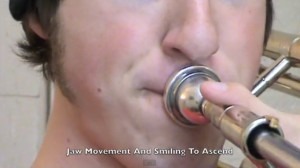
Brass players are lucky to have some of the most gorgeous music written for them. One can’t help but think of Bruckner Symphonies, like the 9th Symphony with 8 horns, 4 of them doubling on Wagner Tubas, 3 trumpets and 3 trombones as well as contrabass tuba; the many brass chorales and Janáček Sinfonietta with four horns, 12 trumpets and 2 bass trumpets!
One forgets the physicality of playing these instruments. Those delicate lip tissues; jaws and necks can be injured. Here are a few hints aimed specifically to brass players.
Warm Up
Spend some time with the mouthpiece alone focusing on the clarity of the tone In other words buzz, play some long tomes and slurs. This can really enhance your sound.
Avoid Forcing
Over time, forcing will take a toll. It will become more and more difficult to keep a steady tone and accuracy will suffer. To learn to play a brass instrument exceptionally well, one must learn how to develop a natural singing tone quality.
Cool Down
Before you put your instrument away for the night, cool down. Just as other muscles in the body, lip muscles tighten after extended exertion. Take five to ten minutes to play low and softly after a performance. Pedal tones are great to relax the lip muscles says Dr. Phillip Cansler of the University of Portland.
Don’t forget to take breaks. Release your lips and jaws by doing gentle “air mouthwashes” or a “fish face.”
Larynx
The larynx is immature in young people before puberty and therefore cannot support extreme pressures. Recent studies are underway to determine the pressure of the mouthpiece, the pressure just behind the embouchure and the area behind the palate in brass musicians. These pressures are the highest in French horn and trumpet players says C. Richard Stasney, M.D., and Associate Clinical Professor of Otolaryngology at Baylor College of Medicine in Houston. Young people are at greatest risk for injury to the oral cavity and cervical tissues. With overuse, the young person’s neck can swell, the result of the expansion or out-pocketing of the spaces surrounding the larynx. These sacs may be filled with air or fluid. This condition is known as laryngocoeles.
Current research has indicated that there is a 60 percent incidence of internal laryngocoeles in French horn players, although external laryngocoeles occur as well. A study reported in Throat Journal, April of 2000, describes a 16 year- old trumpet player who had been playing since the age of nine. Luckily his teacher noticed that the boy’s neck would protrude when he was playing. It is important to seek medical help while these are reducible and asymptomatic.
Laryngocoeles of course can also occur in adults, and they can lead to other complications. Surgery should always be a last resort.
A word to the wise: Chose repertoire wisely. Be vigilant about high, loud, lengthy playing.
Teeth
Orthodontic evaluation is a must for young people who want to play wind and brass instruments. Today many orthodontists can predict growth and determine suitability for particular instruments. If a young person practices a lot, some dental and skeletal problems may occur and they can create subsequent handicaps.
Playing a brass instrument can affect the way your teeth close (occlusion.)
The Journal of the American Dentistry Association reports that only 100 grams of pressure can move a tooth. Playing pressures have been measured at 500 grams! It is vital to monitor the duration and intensity of playing and to prevent malocclusion— a cross- bite or over- bite positioning of the teeth.
Jaw clenching especially overnight, is quite common in the general public. Jaw clenching can cause deflection of the jaw. If your teeth are sore it’s a sign of a problem. Consult a qualified dentist who can fit you with a lingual wire retainer or lingual splint.
Losing a tooth can be a disaster for a brass player. Missing teeth can increase the size of the oral cavity and affect sound production. Brass players should always get an impression made of their teeth
Clean Your Horns
Believe it or not, molds and bacteria can live in your horns and can cause pulmonary problems. Be diligent about cleaning your instrument. Professor Mark Metersky of the University of Connecticut Medical School’s division of pulmonary care found that “One hundred percent of the instruments studied had a type of bacteria called mycobacterium and a mold called fusarium and 80% of players had some pulmonary dysfunction.” The symptoms can include a barking cough, sore throat and inflammation of the lungs in addition to feeling ill!
Play Smart
Overuse, especially to the embouchure, is the most common injury that can occur in brass players. The symptoms include lip pain, swelling, facial fatigue, loss of control, loss of endurance and difficulty playing in the higher range. Avoid playing too many hours or with too much intensity. This can cause a cycle of embouchure problems. Soon, good technique falls by the wayside— the embouchure is tired and sore and it affects the player’s air control. A vicious cycle ensues of lack of control and confidence and can lead to serious problems.
It is very important to allow recovery time after a particularly demanding performance or audition. Take a day or two off before a major problem ensues. Then minimize your playing time and return to playing very carefully.
Always listen to your body and you will have a healthy, long, playing career.
“This is an excerpt from Playing (Less) Hurt by Janet Horvath, published by Hal Leonard Books”



